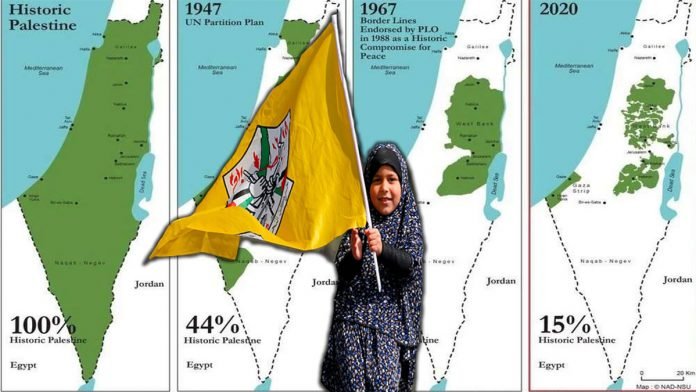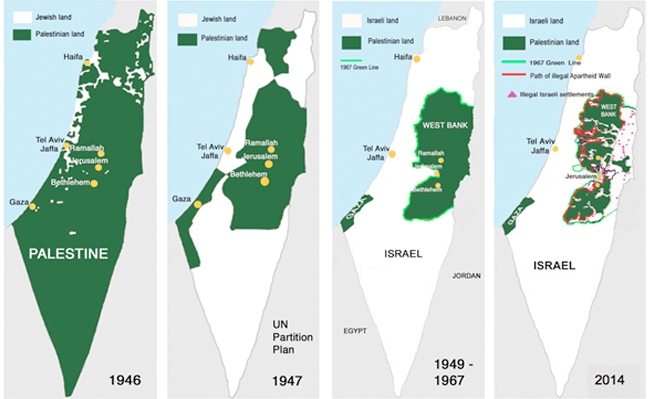
Draft calling for two-state solution passes General Assembly’s Third Committee in a large package of annual pro-Palestinian resolutions that Israel argues shows bias against it.
The United Nations voted overwhelmingly to approve a draft resolution in favour of Palestinian self-determination, with Israel and the United States voting against.
The proposal on Thursday in the UN General Assembly’s Third Committee — the committee that deals with human rights and humanitarian affairs — passed 163 to 5, with 10 abstentions. Canada, which typically votes alongside Israel in such resolutions, stood with the majority.
The resolution emphasized “the right of the Palestinian people to self-determination, including the right to their independent State of Palestine” and “stressed the urgency of achieving without delay an end to the Israeli occupation that began in 1967 and a just, lasting and comprehensive peace settlement between the Palestinian and Israeli sides,” based on a two-state solution.
More than 600,000 Israelis live in settlements in the occupied West Bank and East Jerusalem, where Israel is accused of various abuses against Palestinian civilians. The settlements are also considered illegal under international law.
The draft resolution highlights the right of the Palestinian people to have their own independent State of Palestine. It has long called for the end of the Israeli occupation and encourages a peace settlement between the two sides.
As of 2020, only 15% of historic Palestine remains intact. Floods of inhabitants have sought refuge elsewhere, and many Palestinians have never visited their homeland.

The concept of the two-state solution sounds like a simple fix to the Palestine-Israel conflict. However, it comes with many challenges, including the division of borders, the claim over Jerusalem, the return of Palestinian refugees, and security, according to the NY Times.
However, the majority of the UN panel believes it can be achieved and is pushing for it for the sake of human rights.
Many people are now advocating a one-state solution that gives equal rights to all its citizens.
One-state solution gains ground as Palestinians battle for equal rights
The “one-state solution” refers to a resolution of the Israeli–Palestinian conflict through the creation of a unitary, federal or confederate Israeli-Palestinian state, which would encompass all of the present territory of Israel, the West Bank including East Jerusalem, and possibly the Gaza Strip and Golan Heights.
Depending on various points of view, a one-state solution to the Israeli–Palestinian conflict is presented as a situation in which Israel would ostensibly lose its character as a Jewish state and the Palestinians would fail to achieve their national independence within a two-state solution or, alternatively, as the best, most just, and only way to resolve the Israeli–Palestinian conflict.
For many the UN is just going through the motions The belief in two-state solution crumbles as up to 600,000 Israeli settlers remain on occupied land and what is left of Palestine is scattered patches of land.
Equality could come in the form of one state that includes Israel, the West Bank, the Gaza Strip and East Jerusalem, as writers such as Yousef Munayyer and Edward Said have proposed; or it could be a confederation that allows free movement between two deeply integrated countries. A must-read is Yavne: A Jewish Case for Equality in Israel-Palestine. The process of achieving equality would be long and difficult, and would most likely meet resistance from both Palestinian and Jewish hard-liners.
But it’s not fanciful. The goal of equality is now more realistic than the goal of separation. The reason is that changing the status quo requires a vision powerful enough to create a mass movement. A fragmented Palestinian state under Israeli control does not offer that vision. Equality can. Increasingly, one equal state is not only the preference of young Palestinians.
Critics will say binational states don’t work. But Israel is already a binational state. Two peoples, roughly equal in number, live under the ultimate control of one government. (Even in Gaza, Palestinians can’t import milk, export tomatoes or travel abroad without Israel’s permission.) And the political science literature is clear: Divided societies are most stable and most peaceful when governments represent all their people.
That’s the lesson of Northern Ireland. When Protestants and the British government excluded Catholics, the Irish Republican Army killed an estimated 1,750 people between 1969 and 1994. When Catholics became equal political partners, the violence largely stopped. It’s the lesson of South Africa, where Nelson Mandela endorsed armed struggle until Blacks won the right to vote.
That lesson applies to Israel-Palestine, too. Yes, there are Palestinians who have committed acts of terrorism. But so have the members of many oppressed groups. History shows that when people gain their freedom, violence declines. In the words of Michael Melchior, an Orthodox rabbi and former Israeli cabinet member who has spent more than a decade forging relationships with leaders of Hamas, “I have yet to meet with somebody who is not willing to make peace.”
The idea gaining momentum, even among Palestinian officials who helped negotiate Oslo. When Donald Trump recognised the contested city of Jerusalem as Israel’s capital, the senior Palestinian politician Saeb Erekat said the message was clear: “The two-state solution is over. Now is the time to transform the struggle for one state with equal rights for everyone living in historic Palestine.”
Palestinians already live inside Israel with citizenship. They are families who remained in their towns and villages while others fled or were expelled in wars surrounding Israel’s creation. But their life is not what other Palestinians aspire towards. The Israeli prime minister, Benjamin Netanyahu, said: “Israel is the nation state of the Jewish people – and only it.”
Neither does he back two independent states, leaving Palestinians in limbo.
Quran, the activist, is wary of calling himself a “one-stater”. He knows that for many Israelis, it’s a scary phrase, as it would lead to the end of Zionism in its current form. Under one state, Palestinians might make up approximately half or more of the population. That would mean Israel could cease to be a majority-Jewish country.
But his hopes appear to echo that of Tamimi. “I want everyone in this area to live under the same constitution and same social contract that provides them with freedom, justice and dignity for all.”
Help Us Sustain Ad-Free Journalism
Sorry, I Need To Put Out the Begging Bowl
Independent Journalism Needs You
Our unwavering dedication is to provide you with unbiased news, diverse perspectives, and insightful opinions. We're on a mission to ensure that those in positions of power are held accountable for their actions, but we can't do it alone. Labour Heartlands is primarily funded by me, Paul Knaggs, and by the generous contributions of readers like you. Your donations keep us going and help us uphold the principles of independent journalism. Join us in our quest for truth, transparency, and accountability – donate today and be a part of our mission!
Like everyone else, we're facing challenges, and we need your help to stay online and continue providing crucial journalism. Every contribution, no matter how small, goes a long way in helping us thrive. By becoming one of our donors, you become a vital part of our mission to uncover the truth and uphold the values of democracy.
While we maintain our independence from political affiliations, we stand united against corruption, injustice, and the erosion of free speech, truth, and democracy. We believe in the power of accurate information in a democracy, and we consider facts non-negotiable.
Your support, no matter the amount, can make a significant impact. Together, we can make a difference and continue our journey toward a more informed and just society.
Thank you for supporting Labour Heartlands











